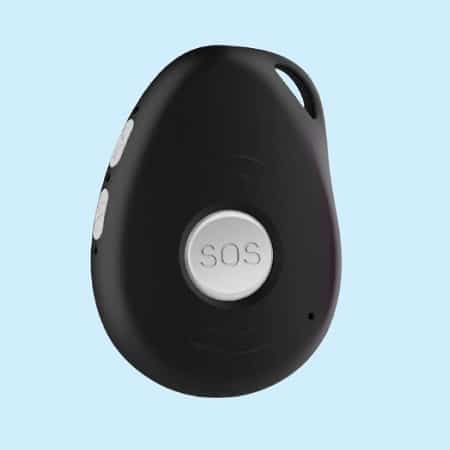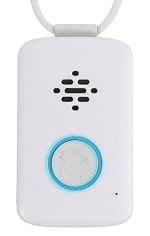Last Updated on September 15, 2021
Reliable location tracking is a vital feature for a mobile medical alert device or mobile personal response systems (mPERS). Operators understand that emergency calls made through a mobile button can come from anywhere, not just from the homes of customers. In case of an emergency, the quality of location tracking technologies employed can make a critical difference. This is especially when the monitoring center operator fails to establish verbal communication with the mPERS device user to confirm his or her location.
GPS (Global Positioning System) works well as a standalone system to determine locations. However, it does have some shortcomings when determining indoor locations. With WPS (WiFi Positioning System) also available, the operator is well-equipped to establish the location of the senior. They will know where to send emergency help to to assist their customers.
Advantage of Mobile Alert Systems With Both GPS & WiFi Positioning
For GPS to work accurately, the mobile device must receive signals from multiple GPS satellites in the sky to calculate the location. For the signals to come through, there needs to be a clear line of sight between the GPS mobile alert device and the satellites. When indoors, especially in tightly-shielded buildings, the line of sight is subject to obstruction. In busy cities with a lot of tall buildings, GPS signals can be further interfered by other electromagnetic waves in the city and their reflections off building walls.
A Wi-Fi positioning system (WPS) offers an alternative approach to establishing the indoor location of the mPERS button device. The mobile alert device detects the signal strength of the Wi-Fi networks that are within range, thereby estimating the distance of it from each of the Wi-Fi hotspots. This is checked against a large database of existing WiFi signal footprints to locate the device.
With the proliferation of WiFi everywhere, especially in populated areas and inside buildings, this method has risen quickly in importance and usability. The WPS approach overcomes the main problems of GPS when it comes to establishing indoor locations, namely difficulties from an obstructed line of sight and signal interference.
What’s great is that the customer does not need to have wi-fi at home or access to a WiFi network anywhere for WiFi positioning to work. The is because the mobile device doesn’t need to be logged in to a WiFi network or to have password access to any Wi-Fi network. All it needs to be able to establish the location is to be Wi-Fi enabled, so that the device can see the networks in the vicinity.
Mobile Medical Alert Systems with GPS & WiFi Positioning Reviews
Here are examples of mobile alert devices equipped with both GPS with WPS from LifeStation and Medical Guardian. Both of these systems use similar mobile device hardware to connect to their monitoring centers.
LifeStation Premium Mobile Medical Alert System with GPS and WiFi

The LifeStation premium mobile medical alert system comes with both GPS and WiFi positioning tracking technologies. The system consists of a mobile emergency button device, lanyard, accompanying charging cradle and access to LifeStation’s 24/7 monitoring center and Caregiver Alerts. It comes with a strong battery that lasts up to 5 days on stand-by. In comparison, most mPERS devices only last one or two days in stand-by mode after a full charge, and they are not equipped with WiFi positioning.
Disclosure: We receive referrals commissions for purchases made (details).
The mobile button device is lightweight, water-resistant and small enough to be worn on the neck with a lanyard. There are no range restrictions. The senior can use the pendant both inside and anywhere outside the home, as long as a good cellular network signal is available. In case of any emergencies, all the user has to do is to press the SOS help button to connect with a LifeStation Care Specialist.
The mobile alert device comes with a two-way speaker and microphone, so the senior can speak into the device directly. There is no separate speaker unit. The device comes with it’s own SIM card to connect emergency calls through a cellular network. No extra cell phone subscription is needed. Automatic fall alert is available as an extra option.
LifeStation is an established industry leader that has kept abreast of the technological changes in the field. They manage their own certified monitoring center, providing assurance to customers that a well-trained care specialist will be available to assist in case of emergencies.
To read more, check out our full LifeStation Mobile Medical Alert with GPS review. If you have any questions or to get a quote, please contact LifeStation directly at 1-866-260-2696. Mention coupon code MASHQ for a discount.
 Need Help? Click to Call LifeStation 1-866-260-2696
Need Help? Click to Call LifeStation 1-866-260-2696Disclosure: We receive referrals commissions for purchases made (details).
Medical Guardian Active Guardian System

Medical Guardian offers a premium mobile medical alert system with both GPS and WiFi positioning called Active Guardian. Active Guardian is an all-in-one medical alert device that includes an emergency call button, speaker, microphone, built-in cellular dialing and optional automatic fall alert. It is also water-resistant, so the device can be used in the shower, where the risk of falling is high.
Disclosure: We receive referrals commissions for purchases made (details).
The Active Guardian device comes with up to 7 days of stand-by battery life after each full charge of around 3 hours. Besides including WiFi positioning, its long battery life is another feature that separates it from other similar products.
Medical Guardian has a newer mobile pendant called the Mini Guardian, introduced in Summer 2020. The Mini Guardian is smaller and more petite compared to Active Guardian.
Medical Guardian also offers a third mobile medical alert system called the Mobile Guardian. Mobile Guardian comes with a larger portable mobile alert device that pairs up with a separate lightweight wrist or neck button. It comes with GPS but not WiFi positioning for location tracking. To learn more, please see our comparison chart.
Medical Guardian is the leader of a new generation of medical alert companies looking to provide outstanding products, service and technology to their customers. Their pricing and terms are competitive and fair to customers. If you have questions, or to discuss which mobile system is a better fit for you or your parent’s needs, please contact Medical Guardian directly at 1-800-311-6142. Medical Guardian has a special offer for two months of free service.
 Need Help? Click to Call Medical Guardian 1-800-311-6142
Need Help? Click to Call Medical Guardian 1-800-311-6142Disclosure: We receive referrals commissions for purchases made (details).
In Summary
Mobile Medical Alert System with GPS and WiFi Positioning offer greater accuracy in determining the exact location of the device than systems that rely on GPS alone. Although GPS works well in tracking down locations, it faces some limitations in finding indoor positions. WiFi positioning bypasses these limitations. Leading medical alert companies like LifeStation and Medical Guardian now include WiFi Positioning in their premium mobile GPS medical alert systems.
Limitation: While every effort has been made to ensure the accuracy of the information contained in this website, the information is supplied without warranties of any kind. We advise all readers to do careful due diligence before purchasing. Take time to visit the company’s website and speak with their representatives.
- Bay Alarm Medical In-Home Cellular Response Speed 46% Faster in 2023 - July 5, 2023
- Medical Alert Systems For Landlines - November 20, 2022
- The Truth About Long-Range Medical Alert Systems - May 1, 2022
In a hurry? Leave us your email, we’ll follow-up with the best tips.
